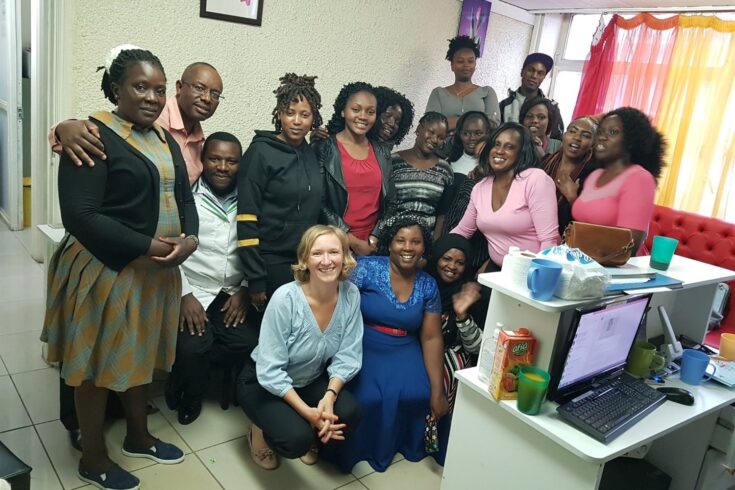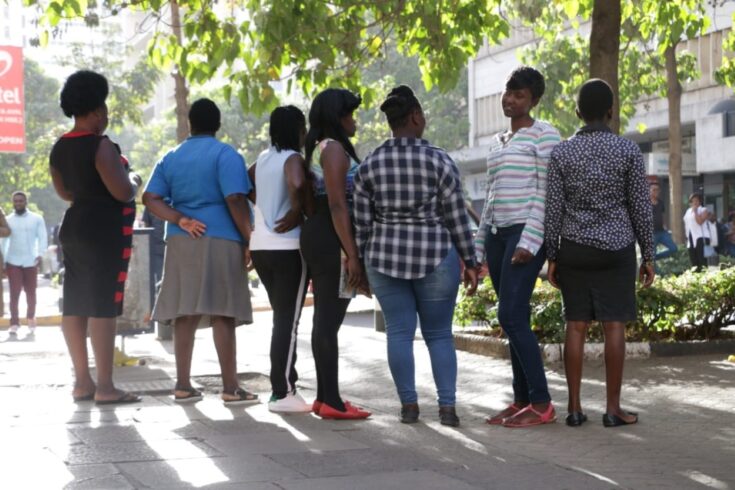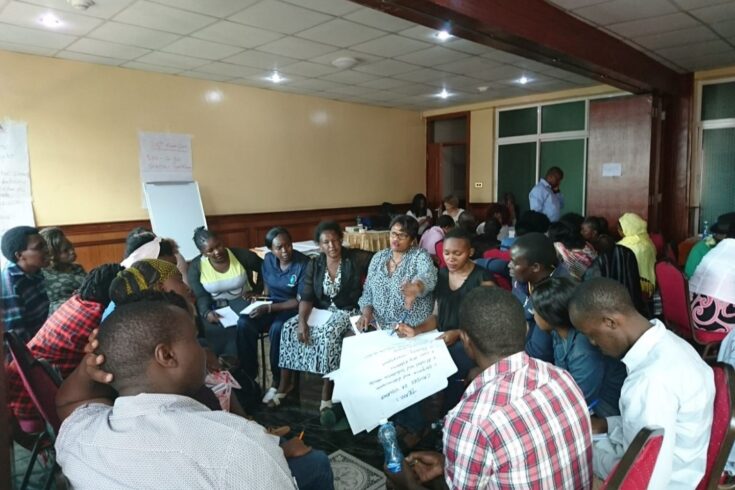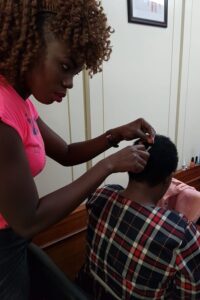How co-creating a research study enabled the team to reach and support marginalised populations using community-led solutions.
By Dr Joshua Kimani, Clinical and Research Director at the University of Manitoba field office in Nairobi, Kenya
Maisha Fiti was a three-year research study with 1,003 women in Nairobi, Kenya, funded by the Medical Research Council (MRC). I was a co-principal investigator in the study, which aimed to look at the link between gender and sexual-based violence and how HIV is acquired. We did this by identifying direct and indirect factors for genital inflammation in female sex workers infected and not infected by HIV.
Thanks to strong community involvement, the findings of the study are contributing to designing interventions that meaningfully involve, engage and address women’s needs while complementing existing HIV prevention strategies.

Maisha Fiti study team with Dr Joshua Kimani (second from left) and Principal Investigator Dr Tara Beattie (front row, far left). Credit: Joshua Kimani and Tara Beattie
Involving public voices and lived experience
In Kenya sex work is illegal and therefore sex workers face stigma and discrimination. We quickly realised that due to the sensitivity of studying violence against women and HIV infection in a marginalised population, we needed to involve the community in co-producing the study. They were involved right from the beginning, during and even after the end of the study.
For us to enrol female sex workers in the study, we needed to reach out to the community. We engaged 300 existing, paid individuals at the community level, called peer educators. These individuals are active sex workers and key drivers for the hotspot-based, peer-led model of engagement and recruitment into an established HIV prevention and treatment programme. This is where Maisha Fiti study participants were drawn from.
Peer educators are generally better educated, influential and respected sex workers. They help others in their support groups to examine and, ultimately, change behaviours that put them at risk of HIV infection or disease progression.
Since the study ended in 2023, we have continued to expand our networks and reach for the ongoing HIV prevention and treatment programme, enrolling about 24,000 active female sex workers. We hope by the end of September 2024 to reach 34,000. Whenever the programme team wants to interact with both male and female sex worker community members, the peer educators are our first port of call.
Activities we ran
From the large pool of 300 peer educators, we selected 10 Maisha Fiti study champions. These 10 individuals then closely worked with the network of peer educators and study team to reach a larger pool of potential study participants.

Maisha Fiti study champions waiting for a taxi for field work. Credit: Joshua Kimani and Tara Beattie
This improved community reach and access to appropriate study information, giving us strong community engagement processes from the start. I would call it an effective social network strategy that used the ‘snowballing method’, whereby the peer educators informed all their friends and peers about the study.
Naming the study
During early meetings with peer educators, it became clear that we could not call the study by our proposed title: ‘Gender-based violence and HIV infection among sex workers in Nairobi’. In our initial pre-study engagement with the peer educators, they observed that this would attract a lot of attention from boyfriends or sex partners and may provoke additional violence.
After a lot of discussions, the peer educators recommended a neutral, recognisable name for the study: ‘Maisha Fiti’, meaning good life for women in Kiswahili. The female sex workers identified with it and liked it so much they wore red ‘Maisha Fiti’ T-shirts as they went about their daily lives. Everybody wanted one.
Strong community engagement
During the study implementation phase, we gave regular updates to the study champions who shared with the larger peer educators body. Each champion was assigned to one of the 10 Sex Workers Outreach Programme clinics across Nairobi, giving information about the study to potential clients who visited the clinic on a daily basis. Study champions would then escort women who were keen to participate to, or tell them how to find, our central clinic in Nairobi where they could enroll in the study.
Despite COVID-19 hitting in March 2020, shortly after the study started in October 2019, our strong community engagement meant we didn’t lose any participants from the study, because we knew how to interact with them. We communicated via WhatsApp groups between the study staff and the champions, and the study champions and those enrolled in the study from their respective clinics. This kept everyone engaged and made sure no one was left out.
The community engagement aspect of the Maisha Fiti study worked so well that we have replicated the processes in other studies. We now believe that having a strong arm of community health education and monitoring is very important, especially when you’re dealing with marginalised communities.
The impact of community engagement
Communicated the study’s aims and recruited participants
We broke down the study protocol and the biology into small bits, to make it easier for our peer educators and study champions to understand it. That is how they were able to come up with the study name because they understood the objective. This meant that by the time women came to our study clinic they knew the inclusion criteria of the study and they knew what to expect.
Reached marginalised communities
Our study champions helped when we needed to follow up with study participants, as they knew where women lived in their community. Without them, participants would have been very difficult to trace if we needed to follow up with them, as most homes in Nairobi do not have addresses with street names and postcodes. Once the study results were available, we shared the results and continued engaging with them.

Maisha Fiti study team consulting with study champions. Credit: Joshua Kimani and Tara Beattie
Provided community-led solutions to support the study
Part of the study involved measuring stress, via levels of the stress hormone cortisol in hair samples. But in Kenya women and men are very sensitive about their hair, and some believe people can use hair cuttings for witchcraft. We also needed to collect vaginal secretions, which takes 40 minutes. The peer educators suggested a solution to make collecting samples acceptable. This involved training two sex workers who were also hairdressers to collect hair samples from the participants and return their hair to the original state if it had been braided. The hairdressers offered nail painting as the women waited for their turns to be served. We also provided free Wi-Fi that engaged the women at low cost.

A community researcher collecting a hair sample for the study. Credit: Joshua Kimani and Tara Beattie
Enabled the study to continue during COVID-19
During COVID-19, people were scattered in their villages, and some couldn’t come to the clinic because of restrictions or fear. Our peer educators suggested doing phone interviews, which could have been dangerous for those living in violent scenarios. But in consultation with the staff, together they agreed on an effective solution. By agreeing on a time and a code, or ‘safe’ word for the participant to use, they could indicate they needed to stop the interview if the situation got risky, and the topic would be changed.
Supported marginalised populations
First respondents to violence against sex workers are often other sex workers, as violence happens in hotspots. We trained our network of sex workers, as well as some police officers, to be ‘first respondents’. They put affected sex workers in taxis and sent them to specific friendly rescue centres for medical help.
Raised awareness about violence against women
We secured additional funding to produce a film about sex workers by the sex workers, to create awareness of why people need to speak up about violence. They used it as their marketing tool, to show their daily lives and advocate for women not to be violated. It shows what the mechanisms are for protecting sex workers, how they support each other and how to respond and support them during acts of violence.
Video credit: London School of Hygiene and Tropical Medicine, the University of Toronto, Public Health and Development in Africa and the Sex Worker Outreach Programme in Kenya. Video transcript and on-screen captions are available by watching on YouTube.
Lessons learned
Provide financial incentives
Our approach required lots of people and we needed a significant budget to support this way of working. You need to provide financial support and incentives. As researchers, we should make the case with funders to ensure we have money for meaningful community engagement as it is a worthy investment.
Cascade information at grass-roots level
In Nairobi and elsewhere, people, especially young people, often trust their peers more than a doctor like me giving them a lot of information. So if we train their peers, the peers can train others and information is cascaded well to the grass-roots level.
Be prepared to learn from the community
There are nuances in communities that researchers can’t understand as outsiders unless you do community engagement. For example having the community involved in giving the study a meaningful and acceptable name, at the very beginning, was essential to its success.
Last updated: 14 March 2025
